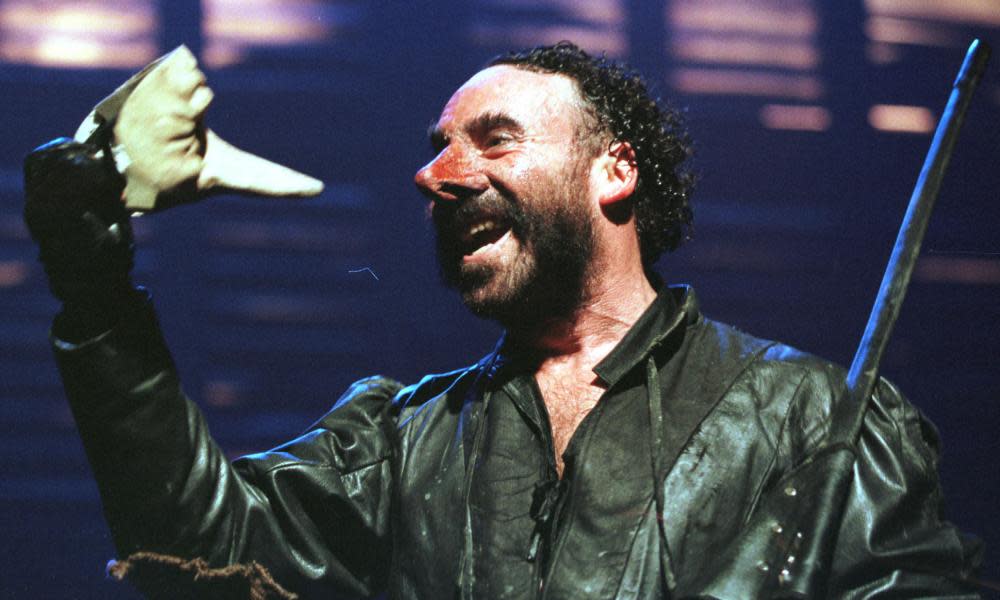Never mind the nose: what makes Cyrano de Bergerac a hero for all time?

Edmond Rostand’s Cyrano de Bergerac is never far away. In February Martin Crimp’s radical adaptation, starring James McAvoy, returns to London, then tours to Glasgow and New York. Then follows the release of Joe Wright’s new movie, with Peter Dinklage in the lead. Although in both cases the actors eschew prosthetic adornments, you could say that the noses generally have it since Rostand’s “comédie héroïque” has been in regular revival since its 1897 premiere. I’ve seen close to a dozen productions over the past half-century and it’s been the source of multiple movies, at least three musicals and an opera. There was also in 2015 a gender-swapped version known as CyranA.
So why does it endure? At its premiere, it was seen as a revolt against the prevailing naturalist drama. As Graham Robb has pointed out, it also had a topical resonance, coming at the time of the Dreyfus affair (the scandal in which army captain Alfred Dreyfus was convicted of treason): “the soft-hearted slasher was everybody’s hero – a man with alien features who suffered for his virtues but represented the society Dreyfus was supposed to have betrayed”. But there are other reasons for its continued popularity: it has a glorious theatricality, glittering poetry and boasts a big star part that has attracted actors as various as Ralph Richardson, Derek Jacobi and Antony Sher on stage and José Ferrer, Steve Martin and Gérard Depardieu on screen.
But I suspect there are deeper reasons for its survival. Since Cyrano lends his poetic genius to a dim-witted rival allowing him to woo the woman Cyrano himself loves, it is one of the great dramas of heroic self-sacrifice. It is a theme that never loses its popularity: contemporary with Cyrano was Sir John Martin-Harvey’s The Only Way, based on Dickens’s A Tale of Two Cities. Henry James pointed out in 1901, discussing Rostand in The Scenic Art, that the novel “lives its hour mainly under favour of the romantic prejudice”. But while being shamelessly romantic, Rostand’s play is also a study of a fiercely independent spirit. Rostand’s Cyrano hates hypocrisy, defies authority and when he says – in Anthony Burgess’s translation – “You’ve no idea how bracing it is to go marching upright against a volley of venom”, I am reminded of Alceste in Molière’s The Misanthrope in his self-lacerating honesty.
Mention of Burgess raises the eternal question of how to render Rostand’s poetry. Seeing the play in French in 1898, Max Beerbohm wrote that “to translate it into English were a terrible imposition to set any one” and even Henry James, who admired Rostand, wrote of “his merciless virtuosity of expression”. I’ve come across versions by Brian Hooker, Patrick Garland and Christopher Fry but Burgess’s, with its eclectic mix of rhyme, rhetoric and quasi-Joycean puns, finds a way to match Rostand’s virtuosity while Crimp clearly demonstrates that the play is also about the dangerous lure of language.

In the introduction to his translation, Burgess makes the pragmatic point that a play’s first duty is “to feed the actors” and I’m struck by how various are the Cyranos I have seen. Edward Woodward, who played it for the National in 1970, offered us a moody introvert but one a little lacking in panache. By contrast Robert Lindsay, who donned the nose in a West End production in 1992, was all vigorous swash and buckle, putting one in mind of the screen heroics of Douglas Fairbanks.
But, alongside McAvoy who offers a fierce, proud, free-thinking Cyrano in black leather, the two performances I remember best come from different RSC productions. Derek Jacobi played the role, with Sinéad Cusack as Roxane and Pete Postlethwaite as a versifying pastry cook, in Terry Hands’s 1983 production and it remains one of his finest hours. Jacobi had the right swagger and impetuosity but there was also a sweet-souled sadness to his performance. Asked if he had ever read Don Quixote, Jacobi replied “Read it? I’ve practically lived it” and there was something about his falling inflection that suggested a whole world of spiritual desolation.
Antony Sher was Cyrano in Gregory Doran’s 1997 production and brought something entirely different to the part. Sher specialised in playing solitary outsiders and his Cyrano was a small, faintly bookish man who was aware of his own absurdity and who even donned specs to pen a love-letter to Roxane: a tiny touch echoed by Mark Rylance in Jerusalem when he too put on glasses as if to belie his character’s alleged wildness.
Oscar Wilde said there are as many Hamlets as there are actors and much the same is true of Cyrano. But Jamie Lloyd, director of the current revival, hit a nerve when he said “the reason the play has endured is that we all have an insecurity, something we’re battling with”. Different actors may put more or less stress on Cyrano’s swordsmanship and showmanship but underneath this is a play about self-sacrifice and solitude, which is, perhaps, the real reason it has lasted for well over a century and in many different cultures.
Jamie Lloyd’s production of Cyrano de Bergerac is at the Harold Pinter theatre, London, 3 February-12 March; the Theatre Royal Glasgow, 18-26 March; and at Brooklyn Academy of Music, New York, 5 April-22 May


